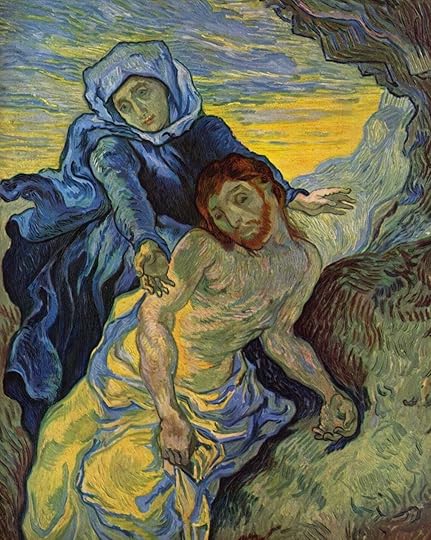The Mercy of God Can Never Now be a Theory Nor Even a Hope

Jesus is Laid in a Garden Tomb — John 19.40-42
On the last Tuesday of his life, Jesus once again entered Jerusalem and began to teach in the temple.
Once upon a time, Jesus says, a man planted a vineyard and leased the vineyard for tenants to care for it. When it came time for harvesting the grapes, the vineyard owner sent his servants to the vineyard to receive from the tenants a share of the fruit. But the tenants beat one servant, killed another servant, and stoned still another.
Yet the Owner of the Vineyard doesn’t react the way you might expect. He doesn’t call the cops or even cancel the contract he’s made them. No, the Owner elects to send his “beloved son.”
“They will listen to my son,” the Owner says.But no, they don’t listen to the Son.Or rather, they do listen to him and they don’t like what they hear.“Those tenants said to one another, “This is the heir. Come, let us kill him, and the inheritance will be ours,”” Jesus said in the temple on Tuesday.
Just two and half days later Jesus is proven him right.
The second Adam’s story ends with a garden for the very same reason the first Adam’s story ended in a garden.
The tenants in Jesus’s parable do not want to have any vineyard owner over them; likewise, we have no interest sharing in the Son’s relation to the Father because from Eve and Adam ever onward, we do not want there to be a Father.
We want to be the Owner.In Question 46 of his Summa, Thomas Aquinas wonders whether there was any other possible way of human deliverance besides the Passion of Christ? Aquinas considers the possible answers and admits that if we ponder the atonement in the abstract, then, yes, God certainly could have reconciled us otherwise than by Christ’s passion for nothing is impossible with God. Christ’s passion is not necessary for the Father to forgive us. Remember, Jesus shows up on the scene already announcing the pardon of God— that’s why his hearers kill him. Of course, considered abstractly, God could have reconciled us by means other than the passion. However, Aquinas reasons, the passion had to happen as it did precisely because the passion is not an abstraction.
Just as it is in Jesus’s parable— The crucifixion is an event in God’s own life.Too often we spend Good Fridays pondering the wrong mystery. We contemplate the deeper magic at work at Calvary. We wonder how what transpires in the passion works to reconcile us to God when, in fact, the beautiful mystery is that the events in Jerusalem and on Golgotha are events in the story of Father, Son, and Holy Spirit.
Remember, Jesus is not merely human. Jesus is the God-who-is-human. Therefore, the events in Jerusalem and on Golgotha are events in the story of Father, Son, and Holy Spirit. They become God’s history. They become God’s identity.
Why did Jesus have to die?Considered from God’s end, the crucifixion of the Son is what it cost the Father to be in fact— and not just conceptually— “the loving and merciful Father of the human persons that in fact exist.” It is well and good to posit that God is all-loving in the abstract.
In the suffering and death of the God-who-is-human and in the Father’s resurrection of him to those who betrayed and murdered him, we know concretely that God is merciful.As Jonathan Edwards grasped,
“Christ’s suffering is the anguish God undergoes to be actually mercifully within history; it is the pain of truly loving us. Thus, salvation is nothing more than that we abide with this Jesus and so with God the Son, abide so completely as to be truly one personal being with him in the triune life. Faith is our side of this closure; a love that is perfected as love unto death is Christ’s side of it, no lesser love being able to keep to us.”
In other words:
The cross is not what God inflicts upon Jesus in order to forgive us; the cross is what the God-who-is-human endures even as he forgives us.Salvation is nothing more and nothing less than sticking close to this God-who-is-human.
On Tuesday at the temple, Jesus finishes his parable with a question, “What do you reckon this father will do when he learns they’ve murdered his son in a shameful fashion and left his body forsaken like trash?
They answer so fast not a one even raised their hand.
“Surely, he will put those wretches to a miserable death!”
But no.
The mercy of God can never now be a theory nor even a hope.
Tonight and tomorrow and the next it is a fact established in history.
 Read Jason Micheli in the Substack appAvailable for iOS and AndroidGet the app
Read Jason Micheli in the Substack appAvailable for iOS and AndroidGet the app
Jason Micheli's Blog
- Jason Micheli's profile
- 13 followers



